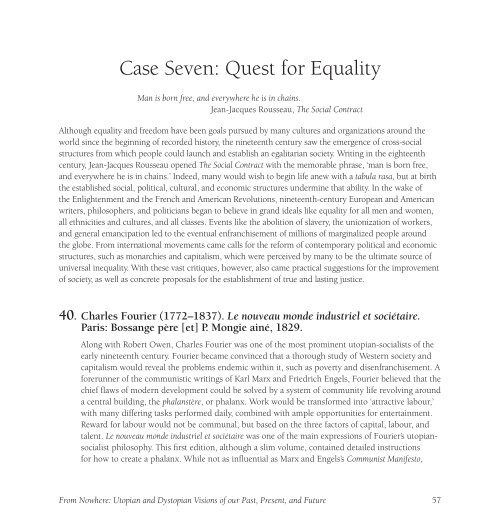From Nowhere: Utopian and Dystopian Visions of our - Chris J. Young
From Nowhere: Utopian and Dystopian Visions of our - Chris J. Young
From Nowhere: Utopian and Dystopian Visions of our - Chris J. Young
Create successful ePaper yourself
Turn your PDF publications into a flip-book with our unique Google optimized e-Paper software.
Case Seven: Quest for Equality<br />
Man is born free, <strong>and</strong> everywhere he is in chains.<br />
Jean-Jacques Rousseau, The Social Contract<br />
Although equality <strong>and</strong> freedom have been goals pursued by many cultures <strong>and</strong> organizations around the<br />
world since the beginning <strong>of</strong> recorded history, the nineteenth century saw the emergence <strong>of</strong> cross-social<br />
structures from which people could launch <strong>and</strong> establish an egalitarian society. Writing in the eighteenth<br />
century, Jean-Jacques Rousseau opened The Social Contract with the memorable phrase, ‘man is born free,<br />
<strong>and</strong> everywhere he is in chains.’ indeed, many would wish to begin life anew with a tabula rasa, but at birth<br />
the established social, political, cultural, <strong>and</strong> economic structures undermine that ability. in the wake <strong>of</strong><br />
the Enlightenment <strong>and</strong> the French <strong>and</strong> American Revolutions, nineteenth-century European <strong>and</strong> American<br />
writers, philosophers, <strong>and</strong> politicians began to believe in gr<strong>and</strong> ideals like equality for all men <strong>and</strong> women,<br />
all ethnicities <strong>and</strong> cultures, <strong>and</strong> all classes. Events like the abolition <strong>of</strong> slavery, the unionization <strong>of</strong> workers,<br />
<strong>and</strong> general emancipation led to the eventual enfranchisement <strong>of</strong> millions <strong>of</strong> marginalized people around<br />
the globe. <strong>From</strong> international movements came calls for the reform <strong>of</strong> contemporary political <strong>and</strong> economic<br />
structures, such as monarchies <strong>and</strong> capitalism, which were perceived by many to be the ultimate s<strong>our</strong>ce <strong>of</strong><br />
universal inequality. With these vast critiques, however, also came practical suggestions for the improvement<br />
<strong>of</strong> society, as well as concrete proposals for the establishment <strong>of</strong> true <strong>and</strong> lasting justice.<br />
40. Charles F<strong>our</strong>ier (1772–1837). Le nouveau monde industriel et sociétaire.<br />
Paris: Bossange père [et] P. Mongie ainé, 1829.<br />
Along with Robert Owen, Charles F<strong>our</strong>ier was one <strong>of</strong> the most prominent utopian-socialists <strong>of</strong> the<br />
early nineteenth century. F<strong>our</strong>ier became convinced that a thorough study <strong>of</strong> Western society <strong>and</strong><br />
capitalism would reveal the problems endemic within it, such as poverty <strong>and</strong> disenfranchisement. A<br />
forerunner <strong>of</strong> the communistic writings <strong>of</strong> Karl Marx <strong>and</strong> Friedrich Engels, F<strong>our</strong>ier believed that the<br />
chief flaws <strong>of</strong> modern development could be solved by a system <strong>of</strong> community life revolving around<br />
a central building, the phalanstère, or phalanx. Work would be transformed into ‘attractive lab<strong>our</strong>,’<br />
with many differing tasks performed daily, combined with ample opportunities for entertainment.<br />
Reward for lab<strong>our</strong> would not be communal, but based on the three factors <strong>of</strong> capital, lab<strong>our</strong>, <strong>and</strong><br />
talent. Le nouveau monde industriel et sociétaire was one <strong>of</strong> the main expressions <strong>of</strong> F<strong>our</strong>ier’s utopiansocialist<br />
philosophy. This first edition, although a slim volume, contained detailed instructions<br />
for how to create a phalanx. While not as influential as Marx <strong>and</strong> Engels’s Communist Manifesto,<br />
<strong>From</strong> <strong>Nowhere</strong>: <strong>Utopian</strong> <strong>and</strong> <strong>Dystopian</strong> <strong>Visions</strong> <strong>of</strong> <strong>our</strong> Past, Present, <strong>and</strong> Future 57


